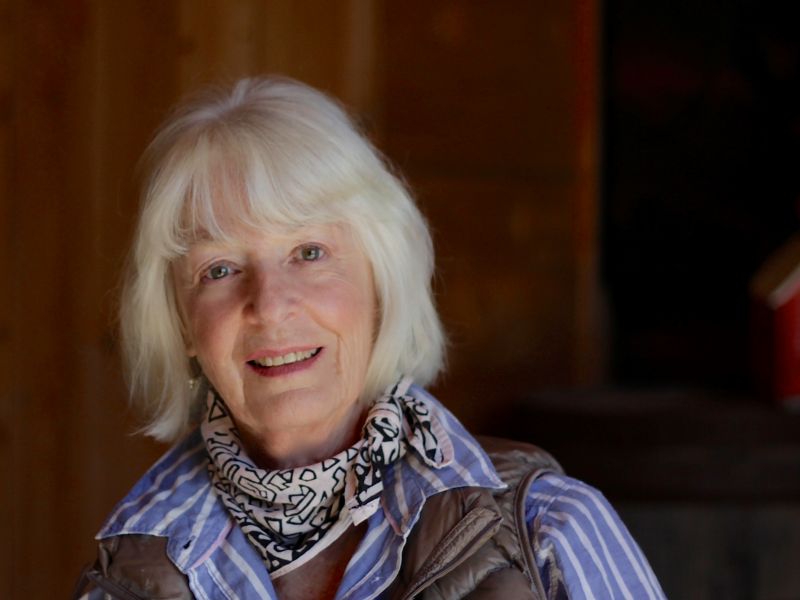Scene 1: The Great White Hope
On October 4, 1968, The New York Times theater critic, Clive Barnes, wrote a review of the Pulitzer Prize winning play, The Great White Hope. James Earl Jones played a tragic hero based on the life of the first black heavyweight champion, Jack Johnson, who committed two sins – defeating a white man, and loving a white woman, played by Jane Alexander. Following his glowing review of Jones in the Broadway production, Barnes writes:
“Of the vast supporting cast, two splendid characterizations stand out … most remarkably, Jane Alexander, as Jack’s girl Ellie. Miss Alexander, as bright as a sparrow, and with an almost spiritual beauty, makes a wonderful foil for Mr. Jones, a kind of frail and defiantly loving Desdemona to this 20th-century Othello.”
Ms. Alexander was 29 years old. It was her breakthrough performance.
Scene 2: Eleanor
In the mid-1970s, Jane Alexander would, as she put it, “inhabit” the role of Eleanor Roosevelt – depicting the former first lady from the age of seventeen to sixty-three. She spent two years researching the part for the TV miniseries.
“I felt the ugly duckling that Eleanor believed herself to be emerge into a swan in her later years, through perseverance, determination, and compassion. She taught me how to overcome adversity, and it was a lesson I took to heart in my own life from the 1970s on.”
Scene 3: The Art of Politics
In 1993, Ms. Alexander was co-starring in the Broadway play The Sisters Rosensweig, when the newly elected President, Bill Clinton, nominated her to be the chief of the National Endowment for the Arts. Ms. Alexander was 53, and had already appeared in 40 movies and TV shows and 100 plays. She was about to plunge into her first unscripted role – leading a government agency that the political right sought to dismantle.
As she recounts in her book, Command Performance, a team was assembled to prepare her for the confirmation hearings. “My confirmation team put me on mock trial, playing the roles of some of my worst adversaries: Jesse Helms, Dan Coats of Indiana, Strom Thurmond. It was easy to see why they were called the murder board: they shot you down each and every time.”
The team’s senior attorney played Senator Helms: “Miss Alexander, how will you make sure that the taxpayer does not have to pay for obscene art like Robert Mapplethorpe’s homosexual photographs …?”
“Senator, I have not seen the photographs you mention …”
Deflection, presumably with the right inflection.
Scene 4: The Embezzler
As the government was vetting Jane Alexander’s nomination for NEA chief, she and her husband received a call “that would turn our lives upside down.” It was from the assistant district attorney of the County of New York. “Could you and your husband come to my office at your earliest possible convenience?”
Jane and her husband arrived the next day.
“I don’t know how to tell you this,” the assistant DA began, “but you have nothing.” Their accountant, a trusted friend, had been systematically embezzling them, and many other clients, for five years. “We listened with growing dismay and despair … It was true we had nothing. He had virtually wiped us out: no pension fund, no life insurance, no stocks, no bonds, no savings accounts, no cash on hand. He had refinanced our summer home, and worst of all he hadn’t paid our taxes for the last five years … he forged our signatures and once even my voice!”
There is a line that Jane Alexander delivers as Ellie in The Great White Hope, as a prosecutor is trying to gain her trust in order to have her implicate Jack, the Black boxer she loves, in some crime – any crime. Suddenly, Ellie realizes the prosecutor’s intent and explodes with this: “You slimy, two-bit, no-dick, mother-grabber.”
We can all think of someone to whom we’d like to deliver that line.
Scene 5: The Wilderness
Back in 1982, Jane and her husband were in Belize, in the days before eco-tourism. “I went home and began writing a screenplay about a female biologist who tracks Jaguars in Belize…What a great adventure, I thought, and what a great part for me!”
The screenplay never materialized. But a meeting during that trip, with a 30-year-old field biologist named Alan Rabinowitz, helped inspire a lifetime of involvement protecting the habitats that protect us all. As a child, she writes in her book, Wild Things, Wild Places, Alan Rabinowitz “was placed in a special education class because of a severe stutter. Alan found comfort sitting in a dark closet with his pet turtle or chameleons because there he could talk to them without stuttering.”
As Jane relays it, Alan’s father knew of his love for animals and took him to the Bronx Zoo, where Alan became fixated on a Jaguar in her cage. “The little boy stood mesmerized on the other side of the bars; here was a trapped, voiceless creature like himself. He promised her that if he ever found his voice he would be a voice for her and keep all animals from harm.”
“My life has been immersed in the world of make-believe ever since I began acting,” writes Alexander. “It is a magical world I love and that summons the most imaginative parts of me. But the natural world holds more mystery and beauty than could ever be contained in one life, or vista, or creature.”
Scene 6: The Great Hall
Jane Alexander, who has deep roots in Nantucket, will be speaking with me at The Atheneum’s Great Hall on Friday, June 15th at 11 am. The conversation will be unscripted. What a great adventure.
Note: For breaking news about Jack Johnson, click here.
